Radiation Health and Safety
1/299
There's no tags or description
Looks like no tags are added yet.
Name | Mastery | Learn | Test | Matching | Spaced | Call with Kai |
|---|
No analytics yet
Send a link to your students to track their progress
300 Terms
Which of the following is a true statement regarding pregnant patients and exposure to radiation?
Dental images are not exposed until the second trimester.
ADA guidelines recommend postponing dental images during pregnancy.
Lead aprons prevent exposure to the fetus.
Exposure time is decreased for pregnant patients.
Lead aprons prevent exposure to the fetus.
Divergence of the x-ray beam is reduced by using the/an _____
8-inch PID
paralleling technique
bisecting technique
short cone technique
paralleling technique
The maximum permissible dose (MPD) for occupationally exposed workers is:
0.005 Sv/year
0.05 Sv/year
0.5 Sv/year
5.0 Sv/year
0.05 Sv/year
Which of the following represents the optimum desired occupational dose?
0 rem/year
0.01 rem/year
1 rem/year
0.05 rem/month
0 rem/year
Which of the following would be an acceptable practice for an operator of dental x-ray equipment?
wearing a film badge only at work
holding the film while fully draped with a lead apron
standing Behind the patient, 6 feet away
holding the tubehead to prevent drifting
wearing a film badge only at work
Which of the following does a film badge monitor?
natural radiation exposures
patient exposures
radiographer's daily occupational radiation exposures
total office staff radiation exposures
radiographer's daily occupational radiation exposures
What tooth structure is the most difficult to view on a dental image?
pulp
cementum
dentin
enamel
cementum
Which of the following is an accurate statement about safe operating procedures?
Pregnant operators must not expose dental images.
All states require all dental staff members wear dosimeters.
Dosimeters monitor operator exposure to x-rays.
ALARA applies to patients but not operators.
Dosimeters monitor operator exposure to x-rays.
There is a new dental x-ray machine in the office. The length of the position indicating device (PID) is changing from 16 to 8 inches. How does this affect the intensity of the x-ray beam? What adjustment needs to be made to keep the density of the images consistent?
The resultant beam will be one-half as intense. You will need to increase the exposure time.
The resultant beam will be one-quarter as intense. You will need to increase the exposure time.
The resultant beam will be two times as intense. You will need to decrease the exposure time.
The resultant beam will be four times as intense. You will need to decrease the exposure time.
The resultant beam will be four times as intense. You will need to decrease the exposure time.
Which type of position indicating device (PID) does not produce scatter radiation?
rectangular
round
conical
both a and b
both a and b
The dental office is open 4 days a week. You change chemicals in two automatic processors every 4 weeks. When using a stepwedge to test developer strength, a total of films _____ should be taken each time the chemicals are changed.
a. 8
16
20
32
32
A reference radiograph is used to compare
densities
film freshness
processing time
fixer solution freshness
densities
The coin test is used to check for
light leaks in the darkroom
proper functioning of the dental x-ray unit
proper safelighting
proper film density
proper safelighting
Extraoral intensifying screens should be checked periodically for
fixer contamination
developer contamination
dirt and scratches
gelatin buildup
dirt and scratches
When densities differ by more than two steps on a stepwedge, which protocol should be followed?
Replace the processing solutions.
Stir the contents of the developer and continue to process.
Increase the heat in the tank by 2 degrees.
Increase kV.
Replace the processing solutions.
On average, processing solution should be changed
once a day
once a week
every 3-4 weeks
every 3-4 months
every 3-4 weeks
According to the CDC, barriers should be used to cover which of the following?
phosphor imaging plate
film
sensor
sensor and phosphor imaging plate
sensor and phosphor imaging plate
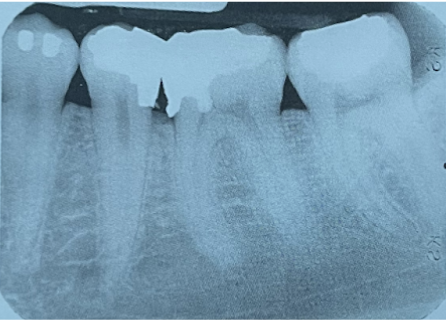
This radiograph is mounted labially. What is the radiopaque restoration on tooth #19 in this image?
composite restoration with an overhang on the mesial surface
amalgam restoration with an overhang on the mesial surface
composite restoration with an overhang on the distal surface
amalgam restoration with an overhang on the distal surface
amalgam restoration with an overhang on the mesial surface
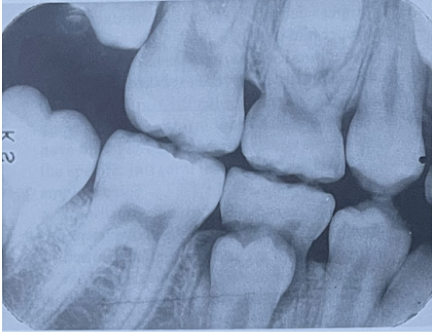
What process is occurring in this image?
external resorption
physiologic resorption
internal resorption
extrusion
physiologic resorption
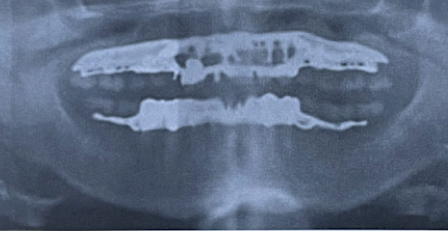
Which structure appears in this panoramic image?
orthodontic appliances
orthodontic bands
metal framework for two partial dentures
fused gold crowns
metal framework for two partial dentures
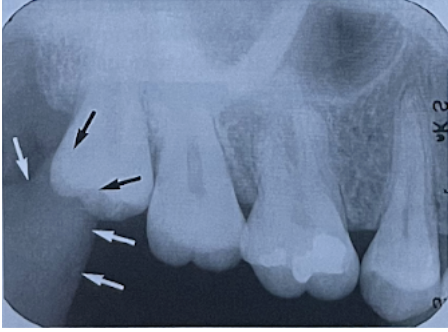
What landmark is indicated by the arrows?
coronoid process
condyle
internal oblique ridge
zygomatic process of the maxilla
coronoid process
Using a digital imaging system, an image has just been taken, but there is no image on the screen and the computer program did not advance to the next image space. Which of the following may be the problem and what is the solution?
x-ray machine is turned off; turn on machine
PID not aligned with receptor; align PID with receptor
sensor is placed in backward; replace receptor in film holder correctly
All of the above
All of the above
How does the median palatine suture appear in a dental image?
almond-shaped radiolucency between teeth #8 and #9
thin radiolucent vertical line between teeth #8 and #9
radiopaque vertical line above teeth #8 and #9
pair of radiopaque diagonal lines beginning by the apices of the maxillary centrals and ending above the apices of the maxillary canines
thin radiolucent vertical line between teeth #8 and #9
Film should be stored in which of the following places?
dark room
cool, dry area
well-ventilated area
in the refrigerator
cool, dry area
Which structure would not be seen as a maxillary landmark on a panoramic image?
styloid process
external auditory meatus
incisive canal
mental foramen
mental foramen
The patient chart should consist of all of the following except:
signed informed consent
duplicate images
signed HIPAA release
original records
duplicate images
How does static electricity appear on a developed
black dots
clear dots
scratches
black branching lines
black branching lines
An informed consent consists of all of the following except:
number and type of exposures
permission to release records to a dentist or physician
potential harm if images are not taken
reason for the images
permission to release records to a dentist or physician
The radiography room is being prepared for a patient. On which of the following should barriers be placed?
headrest, control panel, beam alignment device
computer keyboard, work area, sensor cord
phosphor plate, PID and tubehead, exposure control button
sensor, computer mouse, x-ray unit on/off button
phosphor plate, PID and tubehead, exposure control button
Failure to obtain informed consent is an example of:
negligence
common law
statutory law
standard of care
negligence
The dental record is a legal document. Which of following methods can be used to record patient information in the patient chart?
written in ink
written in pencil
data recorded on a computer
written in ink or data recorded on a computer
written in ink or data recorded on a computer
Which of the following agencies enforces regulations to protect the safety of dental employees from hazardous materials in the dental office?
Environmental Protection Agency (EPA)
Occupational Safety and Health Administration (OSHA)
Centers for Disease Control and Prevention (CDC)
Organization for Safety, Asepsis, and Prevention (OSAP)
Occupational Safety and Health Administration (OSHA)
Chemical-resistant gloves are used to perform which of the following?
set up the radiography room
remove barriers
disinfect surfaces
process film
disinfect surfaces
Films are being taken to the daylight loader for automatic processing. Which of the following would not be done when developing film using a daylight loader?
place film in feed slot with ungloved hands
use clean gloves to open film packets
lift lid to daylight loader and place cup with exposed film packets in daylight loader
place dirty or used gloves through the cuff assembly
place dirty or used gloves through the cuff assembly
Current infection control guidelines come from the
Centers for Disease Control and Prevention
American Dental Association
Occupational Safety and Health Administration
CDC, ADA, and OSHA
CDC, ADA, and OSHA
Which is the method used to prevent cross-contamination during use of a digital sensor?
heat sterilization
disinfection or barrier
barrier technique and disinfection
cold sterilization
barrier technique and disinfection
The disinfectant required with the use of a digital sensor is an EPA registered
high-level disinfectant
intermediate-level disinfectant
low-level disinfectant
sterilant
intermediate-level disinfectant
In addition to the barrier technique, which of the following is an infection control measure for the wire connections from the sensor to the digital image unit?
wiping down with soapy water solution
wiping down with an intermediate-level disinfectant
wiping down with a high-level hospital-grade disinfectant
no specific infection control measures are required for the cords
wiping down with a high-level hospital-grade disinfectant
Which of the following statements is correct regarding use of masks and protective eyewear during dental imaging procedures?
Face masks are required, but protective eyewear is not.
Protective eyewear is required, but face masks are not.
Protective eyewear and face masks are optional.
All PPE, including face masks and protective eyewear, must be worn at all times. Standard precautions apply.
Protective eyewear and face masks are optional.
Film contaminated with saliva should be
placed in a high-level disinfectant solution to prevent cross-contamination
wiped off and placed in a disposable cup
wiped free of saliva with an intermediate-level disinfectant
wiped free of saliva with alcohol
wiped off and placed in a disposable cup
Which of the following is placed in the daylight loader of an automatic film processor prior to opening the film packets?
an empty cup
powdered gloves
powder-free gloves
an empty cup and powder-free gloves
an empty cup and powder-free gloves
The current patient was running, slipped and hit a picnic table with his front teeth. He fractured tooth number 9. Which image is preferred to evaluate this tooth?
occlusal
bitewing
periapical
Panoramic
periapical
In which situation would extraoral radiography not be used?
to evaluate growth and development
to evaluate impacted teeth
to diagnose dental caries
to evaluate the extent of large lesions
to diagnose dental caries
All of the following must be documented in the patient record when exposing dental images except:
exposure settings
reason for the images
number and type of images
diagnosis from the images
exposure settings
You are mounting film with the orientation dot face up (convex side is facing you). Which method of mounting is being used and how are you viewing the film?
Lingual mounting; you are viewing the patient's x-ray images as if you were inside his or her mouth looking out. The patient's left side is on your left side, and the patient's right side is on your right
Labial mounting; you are viewing your patient's x-ray images as if you were inside his or her mouth looking out. Your patient's left side is on your left side, and your patient's right side is on your right
Lingual mounting; you are viewing your patient's x-ray images as if you were facing your patient. Your patient's left side is on your right side, and your patient's right side is on your left side.
Labial mounting you are viewing your patient's x-ray images as if you were facing your patient. Your patient's left side is on your right side, and your patient's right side is on your left side.
Labial mounting you are viewing your patient's x-ray images as if you were facing your patient. Your patient's left side is on your right side, and your patient's right side is on your left side.
You were replenishing the chemicals and mixed the chemicals, putting developer in the fixer and fixer in the developer. What occurred that alerted you that you had made a mistake?
strong ammonia smell
sediment of white crystals
clear amber color
green deposits in the developer
strong ammonia smell
You are in charge of the quality control procedures for dental office, which of following should be performed on a daily basis?
a. Check the phosphor plates for artifacts.
b. Run a test film to check processor solutions.
c. Process an unexposed film to check the film.
d. Check the scanner using an unexposed phosphor plate.
b. Run a test film to check processor solutions.
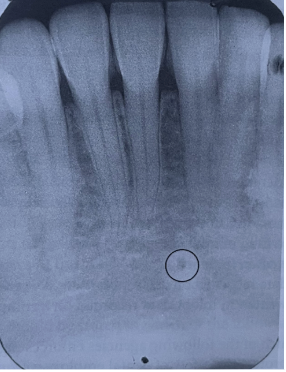
What radiolucent landmark is circled on the dental image?
mental foramen
lingual foramen
mandibular canal
genial tubercles
lingual foramen
Which of the following is not a factor in a missing apical area in a radiograph?
The receptor was not placed high enough in the palate.
The receptor was not placed low enough in the floor of the mouth.
The horizontal angulation was incorrect.
The patient was unable to completely close on the bite block.
The horizontal angulation was incorrect.
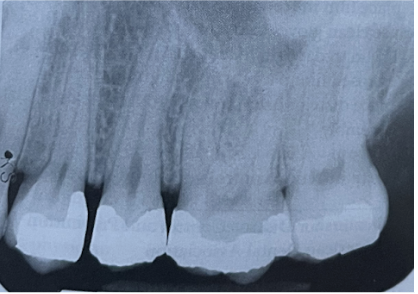
Which of the following conditions exists on this image?
a fixed bridge between the second premolar and second molar
open contacts between maxillary premolars
open contacts between the molars
pulp stone on the second molar
open contacts between maxillary premolars
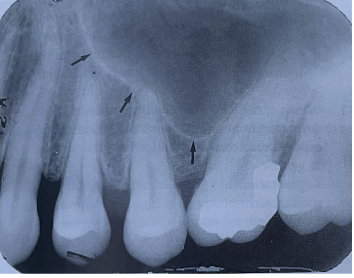
Which image is shown in this film?
frontal sinus
sphenoidal sinus
ethmoidal sinus
maxillary sinus
maxillary sinus
Which of the following would appear most radiopaque?
composite
amalgam
pulp
enamel
amalgam
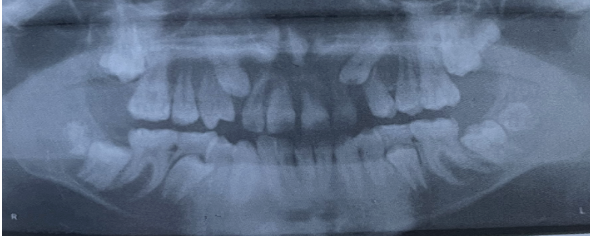
In this panoramic image, which of the following statements is true?
The permanent mandibular second molars are erupted.
There is no evidence of mandibular third molars.
Unerupted maxillary canines are present.
The primary maxillary first molars are still present.
Unerupted maxillary canines are present.
Which of the following affects the sharpness of a dental image?
tungsten filament
milliamperage
focusing cup position
focal spot size
focal spot size
Distortion of an image describes which of the following characteristics?
characteristics of the beam of energy
radiolucent characteristics
geometric characteristics
radiopaque characteristics
geometric characteristics
An underdeveloped film may be caused by which error?
inadequate development time
solution that is too warm
excessive development time
concentrated developer solution
inadequate development time
The purpose of the intensifying screen in a panoramic cassette is to reduce:
exposure time
mounting time
radiation exposure
ghosting
radiation exposure
The office has just started using digital radiography. Analog film was used previously. Exposure time will be:
about the same as for film
increased
decreased
Unchanged
decreased
What exposure control selections) controls the quality of the x-ray beam?
time
kilovoltage
milliamperage
both a and c
kilovoltage
Which of the following is a true statement regarding radiation and patient protection?
X-ray images are routinely prescribed for 6-month recall patients.
Round collimators are preferred over rectangular collimators.
A patient may hold the image receptor in place when XCPs are not available.
The benefit of dental x-ray images outweighs the risk of ionizing radiation.
The benefit of dental x-ray images outweighs the risk of ionizing radiation.
Which of the following is a dose equivalent measurement?
coulombs per kilogram
rad
roentgen
Sievert
Sievert
Which traditional measurement and metric measurement are equal?
roentgen and sievert
rad and gray
rem and coulombs per kilogram
sievert and rad
rad and gray
Which of the following represents the maximum permissible dose (MPD) for the general public?
0.05 rem/month
0.1 rem/year
5 rem/year
20 rem
0.1 rem/year
Which of the following is a true statement regarding pediatric exposures to radiation?
Uncooperative children require panoramic exposures.
Pediatric patients do not require images.
Immature tissues of pediatric patients are less susceptible to radiation than the tissues of adult patients.
A child may be seated in a parent's lap for exposures.
A child may be seated in a parent's lap for exposures.
Which of the following refers to operator protection during dental imaging procedures?
Avoid the primary beam.
Use a lead apron.
Determine the need for dental images.
Avoid retakes.
Avoid the primary beam.
During the exposure of a dental image, the operator:
stands more than 6 feet away and at a right angle to the tubehead
stands in front of and parallel to the primary beam
stands within 6 feet of and parallel to the primary beam
stands in back of the patient's head
stands more than 6 feet away and at a right angle to the tubehead
Multiple shades of gray on an image are controlled by which component of the x-ray machine?
mA
kV
timer
collimator
kV
During the production of x-rays, how much energy is lost as heat?
1%
8%
70%
99%
99%
Which of the following causes cellular damage from x-radiation?
ionization
milliamperage
kilovoltage potential
filtration
ionization
Which statement is true as it relates to the direct theory of radiation injury?
Cell damage results when ionizing radiation directly hits critical areas or targets within the cell.
Direct injuries from exposure to ionizing radiation occur frequently but seldom do noticeable damage.
Most x-ray photons are absorbed by the cell and cause little or no damage.
Indirect injuries occur at the same rate as direct injuries from exposure to ionizing radiation.
Cell damage results when ionizing radiation directly hits critical areas or targets within the cell.
Which of the following changes describes the development of cataracts in a person who has been exposed to excessive radiation?
genetic
generational
short term
somatic
somatic
Which of the following requires less exposure for the patient?
large silver halide crystals
small silver halide crystals
phosphor storage plates
pixels
pixels
Which of the following would actually increase exposure time to a patient?
exposing a panoramic image instead of four bitewings
decreasing target-to-image receptor distance
decreasing kV by 10%
using the bisecting angle technique
decreasing kV by 10%
Which of the following statements best describes the primary beam of energy?
It includes primary, secondary, and scatter radiation.
It contains short waves.
It is unfiltered.
It is measured in coulombs per kilogram.
It contains short waves.
Which of the following is the acronym for the principle that governs exposure to radiation?
NCRP
ALARA
MPD
ANSI
ALARA
Which of the following best describes acute exposures to radiation?
genetic
chronic
short term
leukemia
short term
Which of the following has fairly low sensitivity to x-rays, but is a concern because of its risk of exposure due to its location?
lens of the eye
oral mucosa
bone marrow
thyroid gland
thyroid gland
When should a full adult series of dental images be considered for a child or adolescent?
7 years old
9 years old
12 years old
when clinical evidence of generalized disease is present and the adolescent has first and second molars
when clinical evidence of generalized disease is present and the adolescent has first and second molars
After processing four bitewing films, the fourth film exits the processor and is completely black at one end of the image. What is the reason for the black portion of the image?
developer solution was too weak
processing chemicals were too cold
darkroom door was opened too early
receptor was not exposed to radiation
darkroom door was opened too early
You are using a complete series of dental images to educate your patient on the value of radiography. According to HIPAA, what should not be present in or on the film mount?
the date
the patient's name
radiographs showing impacted teeth
radiographs showing dental caries
the patient's name
How should you dispose of the used developer solution?
Put it in a leakproof biohazard bag.
Flush it down the sanitary drain sewer.
Place it in the septic system.
Place it in a special container to be picked up by a special service.
Flush it down the sanitary drain sewer.
Which of the following should not be disposed of through a waste management system?
unused developer
film
lead foil
Stabe bite block
Stabe bite block
You can dispose of the fixer solution and rinse water into sanitary drain systems when
they are mixed with equal parts of distilled
the temperature is equal to that of the room
the solutions have evaporated by half
all of the silver has been removed
all of the silver has been removed
Which method is used to dispose of silver that has been recovered from used fixer and rinse water solutions?
have it picked up and disposed of by an appropriate waste management service
in the septic tank
in the sanitary sewer
in a biohazard bag
have it picked up and disposed of by an appropriate waste management service
Who/what determines who can expose dental images in the dental office?
Occupational Health and Safety Association (OSHA)
American Dental Association (ADA)
individual states
dentist
individual states
You are destroying old patient records. How do you dispose of the dental radiographs?
as regulated waste
as hazardous waste
as normal office waste
have them collected by an approved waste removal
as normal office waste
Which interaction with x-rays causes the radiopaque areas on a dental image?
Compton's scatter
photoelectric effect
coherent scatter
no interaction
photoelectric effect
You have a package of outdated dental film. How should you dispose of it?
Put it in the trash receptacle.
Store it for 6 years, then discard in regular trash.
Shred it and place it in a biohazard bag.
Contact an approved waste removal service.
Contact an approved waste removal service.
Exposed film and phosphor plates should be collected and transferred to the darkroom in or scanning area.
the lab coat pocket
the operator's hand
a cup
the bracket tray
a cup
Infection control practiced during exposure involves all of the following except
the beam alignment device is placed on the uncovered countertop after the procedure
the exposed film or phosphor plates are dried after use
the beam alignment device is reassembled as needed
the exposed film or phosphor plates are placed in a cup
the beam alignment device is placed on the uncovered countertop after the procedure
Infection control practices during processing involve which of the following?
transport
assembly of beam alignment devices
checking kV settings
steadying the tubehead
transport
During dental imaging procedures, exposure to pathogens occurs most frequently from which of the following?
touch
transfer
splash, spatter, and droplet
a and b
a and b
Which of the following is a single-use item used in a dental imaging procedure?
face mask
lead apron
beam alignment device
phosphor plate
face mask
Which describes proper storage of a lead apron?
folding and placing it on the chair for reuse
hanging it between uses
rolling it
Any method may be used.
hanging it between uses
You are at greatest risk of contracting your patient's hepatitis C virus from which source?
your gloves
the film packet
the lead apron
the beam alignment device
the film packet
Which of the following is not classified as a noncritical instrument?
beam alignment device
position indicating device of the dental x-ray tubehead
exposure button
lead apron
beam alignment device
In trying to explain to a patient about the sequence of injury, you use example of a sunburn. What stage of injury is being described?
recovery
latent period
period of injury
cumulative effect
period of injury
Phosphor plates are cleaned with which of the following disinfectants?
low-level disinfectant
intermediate-level disinfectant
high-level disinfectant
disinfectant specifically for phosphor plates
disinfectant specifically for phosphor plates
An instrument that contacts mucous membranes but does not penetrate soft tissue or bone is considered
critical
semicritical
noncritical
semicritical and noncritical
semicritical
Which statement is correct concerning the use of gloves during a dental imaging procedure?
Gloves must be washed before use, to remove powder residue.
Gloves must be sterile for all procedures.
New gloves must be worn for each patient.
Gloves must be worn only when contact with saliva is anticipated.
New gloves must be worn for each patient.